
*2011 Recipient of Combined Jewish Appeal's
Community Service Award*

The Mack Belson Foundation believes in the academic success of children. We believe that every child should be allowed to reach their full potential. Research has consistently shown that early assessment and intervention is one of the most powerful antidotes for students who are ‘at risk’ for learning challenges.
Child development research has established that the rate of human learning and development is most rapid in the preschool years. Early intervention increases the developmental and educational gains for a child, improves the functioning of the family, and reaps long-term benefits for society. Early intervention has been shown to result in the child: (a) needing fewer special education and other services later in life; (b) being retained in grade less often; and (c) in some cases showing no academic differences from their classmates years after intervention.
The Early Intervention Program was formally introduced by The Bronfman Jewish Education Centre in the Jewish elementary schools in 2002. Since its inception, it has reached thousands of students. In 2009, as a result of a partnership with The Mack Belson Foundation, the program was renamed to honour the memory of Mackenzie Belson and The Mack Belson Early Academic Intervention Program was officially launched. The Early Intervention Program originally compromised three phases. The first phase ran from September through January, when hundreds of kindergarten students attending Jewish elementary schools were assessed. The primary goal of the assessment was to assure that all young children were developing their foundational academic skills and to determine which children were at risk. Meetings with the teachers and the administration to review overall class and individual profiles were scheduled. Phase two ran from the end of January through mid-April. The Early Intervention consultants worked with teachers and provided them with strategies to provide students identified as at risk with a solid foundation. Finally, from mid-April through early June, these students were reassessed. By the end of the academic year, meetings were scheduled with teachers and administration to discuss their performance results. Meetings were also scheduled for the following September through October to discuss these students' performance results with their Grade 1 teacher.
Now our program is moving to a higher level.
The Mack Belson Early Intervention Academic Program is so proud to announce that it will be one of the first programs in Quebec to use the highly successful Research to Intervention (RtI) model. For the 2012/2013 school year, we will be using this model as a pilot in several of the Jewish elementary schools. Response to Intervention (RtI) is a multi-tiered approach to the early identification and support of students with learning needs. The RtI process begins with high-quality instruction and universal screening of all children in the general education classroom. Struggling learners are provided with interventions at increasing levels of intensity to accelerate their rate of learning. These services may be provided by a variety of personnel, including general education teachers, special educators, and specialists. Progress is closely monitored to assess both the learning rate and level of performance of individual students. Educational decisions about the intensity and duration of interventions are based on individual student response to instruction. RtI is designed for use when making decisions in both general education and special education, creating a well-integrated system of instruction and intervention guided by child outcome data.
For RTI implementation to work well, the following essential components must be implemented:
- High-quality, scientifically based classroom instruction. All students receive high-quality, research-based instruction in the general education classroom.
- Ongoing student assessment. Universal screening and progress monitoring provide information about a student’s learning rate and level of achievement, both individually and in comparison with the peer group. These data are then used when determining which students need closer monitoring or intervention. Throughout the RTI process, student progress is monitored frequently to examine student achievement and gauge the effectiveness of the curriculum. Decisions made regarding students’ instructional needs are based on multiple data points taken in context over time.
- Tiered instruction. A multi-tier approach is used to efficiently differentiate instruction for all students. The model incorporates increasing intensities of instruction offering specific, research-based interventions matched to student needs.
- Parent involvement. Schools implementing RTI provide parents information about their child’s progress, the instruction and interventions used, the staff who are delivering the instruction, and the academic or behavioral goals for their child.
The Mack Belson Foundation and BJEC look forward to the future as we plan new and exciting ways to ensure the academic success of all students. Our goal is to grow this program but we need your help. We will continue our fundraising efforts so we can expand the services offered and help as many children as possible.
For more information, please contact: Aviva Segal 514-345-2645 Ext. 3217 aviva.segal@bjec.org
COPYRIGHT 2006 THE MACK BELSON FOUNDATION.
ALL RIGHTS RESERVED